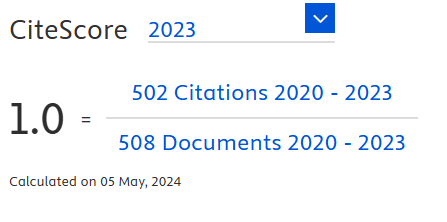CHANGES IN EATING BEHAVIOURS FOLLOWING BARIATRIC SURGERY: A PROSPECTIVE STUDY
DOI:
https://doi.org/10.18006/2021.9(Spl-1-GCSGD_2020).S101.S109Keywords:
Eating Behaviour, Emotional Eating, External Eating, Bariatric Surgery, DiabetesAbstract
Adopting healthy eating behavior is important in achieving successful weight loss after bariatric surgery. This study aims to determine the changes in eating behaviors 6 months after surgery. Fifty-seven patients who went through bariatric surgery in two tertiary referral hospitals were recruited and interviewed before surgery (T0), three (T1), and six (T2) months after surgery. Eating behaviors were assessed using the Dutch Eating Behavior Questionnaire (DEBQ), which measured emotional, external, and restrained eating. Higher subscale scores indicate strong behavioral traits. Other information including psychological distress, quality of life, socio-demography, and morbidity were collected. Generalized Estimating Equation (GEE) model was developed to study the change in eating behaviors and its’ predictors over time. Participants of the study were mostly women, from the Malay ethnic group and the average age at the time of surgery was 39.4 years. Emotional and external eating scores changed significantly over time with the values recorded at various time intervals as follows: 2.06 and 2.86 before surgery; 1.64 and 2.25 three months after surgery; and 1.81 and 2.40, 6 months after surgery. Reduction in the third month followed by a slight increase at the sixth was noted. Restrained eating did not show a significant change. The presence of diabetes was also associated with higher emotional and external eating scores. Further, higher anxiety scores were associated with higher external eating. Favorable changes in eating behaviors were noted after bariatric surgery. However, a risk of a reversal in the improvement was present. The emotional and external eating behaviors in surgical candidates should be identified and addressed accordingly with special attention to diabetic patients.
References
Baig S, Priya P, Mahawar K, Shah S (2019) Weight Regain After Bariatric Surgery—A Multicentre Study of 9617 Patients from Indian Bariatric Surgery Outcome Reporting Group. Obesity Surgery 29: 1583–1592.
Barr ML, Tabone LE, Cox SJ, Brode C, Szoka N, Olfert IM, Davisson L, Olfert MD (2019) Bariatric Surgery Outcomes in Appalachia Influenced by Surgery Type, Diabetes, and Depression. Obesity Surgery 29 (4): 1222–1228.
Benzerouk F, Gierski F, Ducluzeau PH, Bourbao-Tournois C, Gaubil-Kaladjian I, Bertin É, Kaladjian A, Ballon N, Brunault P (2018) Food addiction, in obese patients seeking bariatric surgery, is associated with higher prevalence of current mood and anxiety disorders and past mood disorders. Psychiatry Research 267(November 2017): 473–479.
Campos GM, Rabl C, Mulligan K, Posselt A, Rogers SJ, Westphalen AC, Lin F (2009) Factors associated with weight loss after gastric bypass. Archives of Surgery 143(9): 877-884.
Carter PL (2015) The evolution of bariatric surgery. The American Journal of Surgery 209: 779–782.
Chesler BE (2012) Emotional eating: a virtually untreated risk factor for outcome following bariatric surgery. The Scientific World Journal : 365961.
Coleman KJ, Huang Y, Hendee F, Watson HL, Casillas RA, Brookey J (2014) Three-year weight outcomes from a bariatric surgery registry in a large integrated healthcare system. Surgery for Obesity and Related Diseases 10(3): 396–403.
Conceição EM, Goldschmidt A (2019) Disordered eating after bariatric surgery: Clinical aspects, impact on outcomes, and intervention strategies. Current Opinion in Psychiatry 32(6): 504–509.
Conceição E, Mitchell JE, Vaz AR, Bastos AP, Silva C, Cao L, Brandão I, Machado PPP (2014) The presence of maladaptive eating behaviors after bariatric surgery in a cross sectional study : Importance of picking or nibbling on weight regain. Eating Behaviors 15: 558–562. https://doi.org/10.1016/j.eatbeh.2014.08.010
da Silva SSP, Maia AC (2012) Obesity and Treatment Meanings in Bariatric Surgery Candidates : A Qualitative Study. Obesity Surgery 22:1714–1722.
Dochat C, Godfrey KM, Golshan S, Cuneo JG, Afari N (2019) Dietary restraint and weight loss in relation to disinhibited eating in obese Veterans following a behavioral weight loss intervention. Appetite 140(May): 98–104.
García-mayor RV, García-soidán FJ (2016) Eating disoders in type 2 diabetic people : Brief review. Diabetes & Metabolic Syndrome: Clinical Research & Reviews 11(3): 221–224.
Geerts MM, van den Berg EM, van Riel L, Peen J, Goudriaan JE, Dekker JJM (2020) Behavioral and psychological factors associated with suboptimal weight loss in post-bariatric surgery patients. Eating and Weight Disorders 2020:May 29.
Geller S, Levy S, Goldzweig G, Hamdan S, Manor A, Dahan S, Rothschild E, Stukalin Y, Abu-Abeid S (2019) Psychological distress among bariatric surgery candidates: The roles of body image and emotional eating. Clinical Obesity 9(2): e12298.
Konttinen H, Peltonen M, Sjöström L, Carlsson L, Karlsson J (2015) Psychological aspects of eating behavior as predictors of 10-y weight changes after surgical and conventional treatment of severe obesity: results from the Swedish. The American Journal of Clinical Nutrition 101(1): 16–24.
Laurenius, Larsson I, Bueter M, Melanson KJ, Bosaeus I, Forslund HB, et al. (2012) Changes in eating behaviour and meal pattern following Roux-en-Y gastric bypass. International Journal of Obesity.36(3): 348–355.
Luiz LB, Brito DS, Debon M, Brandalise N, Azevedo JTD, Monbach KD (2016) Variation of Binge Eating One Year after Roux- en-Y Gastric Bypass and Its Relationship with Excess Weight Loss. PLoS ONE 353:1–9.
Madura JA, Dibaise JK (2012) Quick fix or long-term cure ? Pros and cons of bariatric surgery. F 1000 Medicine Reports 9: 1–9.
Monpellier VM, Janssen IMC, Antoniou EE, Jansen ATM (2019) Weight Change After Roux-en Y Gastric Bypass, Physical Activity and Eating Style: Is There a Relationship? Obesity Surgery 29(2): 526–533.
Naseri P, Majd HA, Kariman N, Sourtiji A (2016) Comparison of generalised estimating equation (GEE), mixed effects models (MEM) and repeated measure ANOVA in analysis of menorrhagia data. Journal of Paramedical Science 7(1): 32–40.
Nasirzadeh Y, Kantarovich K, Wnuk S, Okrainec A, Cassin SE, Hawa R, Sockalingam S (2018) Binge eating, loss of control over eating, emotional eating, and night eating after bariatric surgery: Results from the Toronto Bari-PSYCH cohort study. Obesity Surgery 28(7): 2032–2039.
Nicolau J, SImo R, Sanchis P, Ayala L, Fortuny R, Zubillaga I, Masmiquel L (2015) Eating disorders are frequent among type 2 diabetic patients and are associated with worse metabolic and psychological outcomes : results from a cross-sectional study in primary and secondary care settings. ActaDiabetologica 52(6): 1037–1044.
Nolan L, Geliebter A (2012) Night eating is associated with emotional and external eating in college students. Eating Behaviors13(3): 202–206.
Novelli IR, Fonseca LG, Lopes DG, Dutra ES, de Carvalho KMB (2017) Emotional eating behavior hinders body weight loss inwomen after roux-en-Y gastric bypass surgery. Nutrition 49:13-16.
Odom J, Zalesin KC, Washington TL, Miller WW, Hakmeh B, Zaremba DL, Altattan M, Balasubramaniam M, Gibbs DS, Krause KR, Chengelis DL, Franklin BA, McCullough PA (2010) Behavioral predictors of weight regain after bariatric surgery. Obesity Surgery 20(3): 349–356.
Opolski M, Chur-Hansen A, Wittert G (2015) The eating-related behaviours, disorders and expectations of candidates for bariatric surgery. Clinical Obesity 5(4): 165–197.
Pinto-Bastos A, de Lourdes M, Brandão I, Machado PPP, Conceição EM (2019) Weight loss trajectories and psychobehavioral predictors of outcome of primary and reoperative bariatric surgery: a 2-year longitudinal study. Surgery for Obesity and Related Diseases 15(7): 1104–1112.
Quek KF, Atiya AS, Heng NGC, Beng CC (2007) Validation of the hospital anxiety and depression scale and the psychological disorder among premature ejaculation subjects. International Journal of Impotence Research 19(3):321–325.
Robinson AH, Adler S, Stevens HB, Darcy AM, Morton JM, Safer DL (2014) What variables are associated with successful weight loss outcomes for bariatric surgery after 1 year ? Surgery for Obesity and Related Diseases 10 (4): 697-704
Sararaks S, Azman AB, Low LL, Rugayah BMAA, Hooi LN, Razak MA, et al. (2005) Validity and Reliability of the SF • 36 : The Malaysian Context. Malaysian Medical Journal 60(2): 163–179.
Sevinc M, Cao L, Coskun H, Mitchell JE, Crosby RD, Mitchell JE (2016). Association between depression and eating behaviors among bariatric surgery candidates in a Turkish sample. Eating and Weight Disorders 22(1): 117–123.
Sillén L, Andersson E, Andersson E (2017) Patient Factors Predicting Weight Loss after Roux-en-Y Gastric Bypass. Journal of Obesity 2017:3278751. doi: 10.1155/2017/3278751.
Sjostrom L (2013) Review of the key results from the Swedish Obese Subjects ( SOS ) trial – a prospective controlled intervention study of bariatric surgery. Journal of Internal Medicine 273: 219–234.
Subramaniam K, Low WY, Chinna K, Chin K (2017) Psychometric Properties of the Malay Version of the Dutch Eating Behaviour Questionnaire ( DEBQ ) in a Sample of Malaysian Adults Attending a Health Care Facility. Malaysian Journal of Medical Science 4: 64–73.
Van Hout GCM, Jakimowicz JJ, Fortuin FM, Pelle AJM, van Heck GL (2007) Weight loss and eating behavior following vertical banded gastroplasty. Obesity Surgery 17(9): 1226–1234.
Van Strien T, Frijters JER, Bergers GP, Defares PB (1986) The Dutch Eating Behaviour Questionnaire (DEBQ) for assessment of
restrained, emotional and external eating behaviour. International Journal of Eating Disorder 5(2): 295–315.
Ware JJ, Sherbourne C (1992) The MOS 36-item short-form health survey (SF-36). Conceptual frame work and Item Selection. Medical Care 30: 473–483.
White MA, Kalarchian MA, Masheb RM, Marsha D, Grilo CM (2010) Loss of control over eating predicts outcomes in bariatric surgery: A prospective 24-month follow-up study. Journal of ClincalPyschiatry 71(2): 175–184.
Wimmelmann CL, Dela F, Mortensen EL (2014) Psychological predictors of weight loss after bariatric surgery : A review of the recent research. Obesity Research & Clinical Practice 8(4): e299–e313.
Zigmond A, Snaith R (1983) The Hospital Anxiety and Depression Scale. ActaPsychiatrica Scandinavia 67: 361–370.
Downloads
Published
How to Cite
Issue
Section
License

This work is licensed under a Creative Commons Attribution-NonCommercial 4.0 International License.












